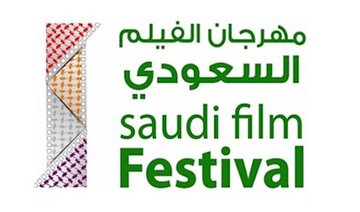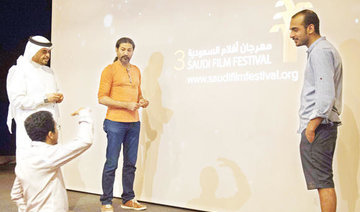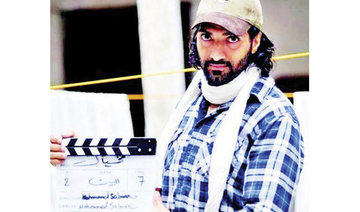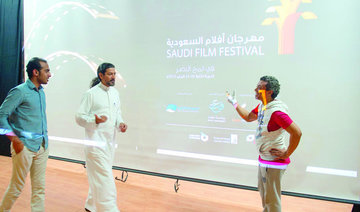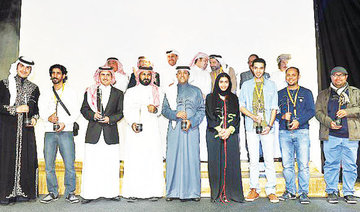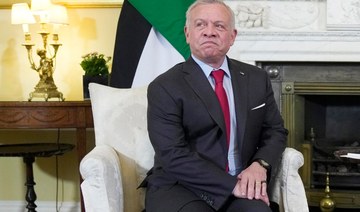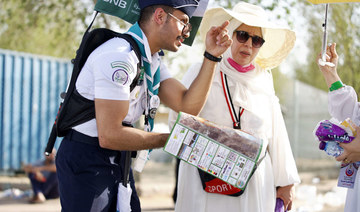RIYADH: The head of the main film festival in Saudi Arabia, where cinemas are banned, wants the government to invest in the sector as part of its campaign to encourage entertainment.
Ahmed AlMulla made the comments in an interview with AFP ahead of the fourth Saudi Film Festival, which runs from March 23-28 in the Gulf coastal city of Dhahran.
This year’s festival is the first since the kingdom late last year began a cautious push to introduce entertainment, despite opposition from conservative groups.
Among the events on offer for Saudi spectators have been the New York theatrical group iLuminate, the Comic-Con pop culture festival, and WWE wrestling.
“It’s nice to see all kinds of events here and people coming from outside,” AlMulla said.
But local talent needs to be trained, with support from the government, he said in a telephone interview.
“I think they must” fund it, he said, “because this is investment, the real investment.”
Among directors of the 59 Saudi films to be screened at this year’s festival are some who trained overseas, he said.
Saudi Arabia has created a government agency to support private firms organizing entertainment events, under a wideranging “Vision 2030” plan for economic and social reform.
The plan also calls for development of an arts and media industry, but with public theaters and cinemas banned, the sector is starting from a low base.
“We are waiting for the change, really. We want to create it from inside, not hosting events only,” AlMulla said.
“We have lots of talent working underground and nobody knows about them.”
Despite the annual film festival, Saudi Arabia lacks a film industry although female students can study filmmaking at a women’s university in Jeddah.
Saudi films have also won international recognition.
The romantic comedy “Barakah Meets Barakah” by Mahmoud Sabbagh was screened at last year’s Berlinale, and in 2013 Haifaa Al-Mansour’s “Wadjda” became the first Saudi film listed as a candidate for a foreign-language Oscar.
Saudis are voracious consumers of online videos and rank among the world’s top viewers of YouTube.
Private film screenings are also held in the kingdom, but Saudi Arabia’s highest-ranking cleric warned in January of the “depravity” of cinemas and music concerts.
This is the third consecutive annual film festival after it resumed in 2015 following an absence of seven years.
The event is organized by Dammam’s Society of Culture and Arts, and last year went ahead with permission from the local government.
AlMulla says this year’s festival will be bigger than ever, even though he laughs off a question about how it will be financed.
“We’ll arrange for that,” he says, adding that some sponsors have been found.
The festival moves this year from cramped quarters at the arts society to larger grounds near a new cultural center run by Saudi state oil giant Aramco.
The indoor and outdoor screening areas can hold almost 2,000 people.
Aside from the new venue, this year’s festival will feature a “production market” where filmmakers can meet with local production houses “to make deals,” AlMulla said.
The festival is also increasing its public education effort.
Students will be brought in to watch children’s films, local and international experts will hold panel discussions, and the festival is to issue a book on late Japanese filmmaker Akira Kurosawa.
The number of films and scripts vying for competition has increased but fewer applicants were accepted for screening in an effort to raise quality, AlMulla said.
The festival opens with a drama that resonates as the kingdom’s efforts to expand entertainment face resistance from conservatives.
“Wasati” directed by Ali Alkalthami is based on the true story of extremists trying to disrupt a play at a university theater in Riyadh 10 years ago.
Saudi film fest head says cinema needs state funding
Saudi film fest head says cinema needs state funding
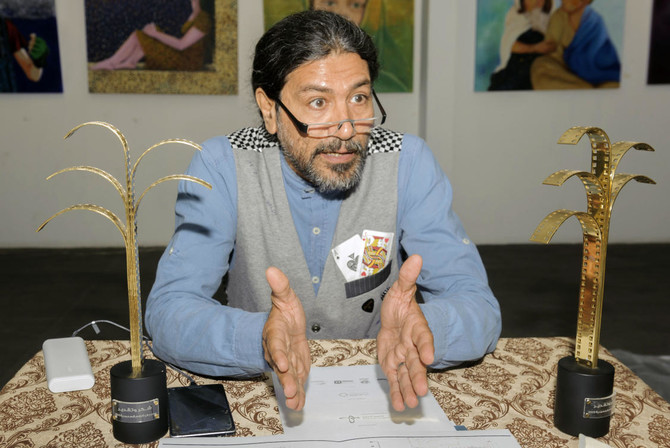
Al-Qunfudah celebrates mango festival as production grows

- Several types of mangoes, including Tommy Atkins, Sensation and Langra, are grown locally in Al-Qunfudah
- Saudi mango production grew to 88,600 tons annually in 2023, with Al-Qunfudah producing a little over 50 percent of national output
RIYADH: The Saudi coastal city of Al-Qunfudah on the Red Sea is celebrating the 13th season of its mango festival this week.
Organized by the Ministry of Environment, Water and Agriculture’s branch in the Makkah region, the event began on Tuesday and will run for five days.
Through the festival, organizers hope to promote mangoes and other agricultural products, as well as help farmers with marketing and develop the Kingdom’s agricultural industry.
Several types of mangoes, including Tommy Atkins, Sensation and Langra, are grown locally in Al-Qunfudah.
Around the city, there are more than 3,000 farmers who own almost half a million mango trees, producing more than 45,000 tons of mango annually, the Saudi Press Agency reported.
Guests at the mango festival include Makkah Region Gov. Prince Khalid Al-Faisal, as well as Majid Al-Khalif, director general of the Ministry of Environment, Water and Agriculture’s branch in Makkah region.
“The mango festival is considered a marketing window, waited (for) by people every year because it attracts shoppers and those looking for high-quality agricultural products,” said Al-Khalif.
The festival includes activities for guests such as a heritage corner, games and prizes, and educational programs for farmers.
Farmers in Saudi Arabia have cultivated mangoes for more than 50 years. The production season begins in March, with harvest usually starting in May and lasting for three months.
Last year, statistics showed that Saudi mango production grew to 88,600 tons annually, with Al-Qunfudah producing a little over 50 percent of national output.
The seasonal fruit is grown in areas including Jazan’s Sabya, Abu Arish, Al-Darb, Samtah and Baish governorates.
Saudi crown prince meets with Arab leaders on sidelines of Manama summit

- Saudi Arabia’s crown prince urged international community to fulfil its responsibility by demanding an immediate end to Israeli aggression
RIYADH: Saudi Arabia’s Crown Prince Mohammed bin Salman met with Arab leaders on the sidelines of an Arab League summit taking place in Manama on Thursday.
The crown prince met with Kuwaiti Prime Minister Sheikh Ahmad Abdullah Al-Ahmad Al-Sabah, Jordan’s King Abdullah, Syria’s President Bashar Al-Assad, and UN Secretary-General Antonio Guterres.
The summit has been dominated by the Israel-Hamas war and the crown prince said in a speech that the Kingdom “emphasizes the need for continued collaboration to confront the brutal aggression against Palestine.”
He urged the international community to fulfil its responsibility by demanding an immediate end to Israeli aggression and ensuring the delivery of humanitarian aid to Gaza.
The crown prince also stressed “the importance of pursuing a just and comprehensive solution to the Palestinian issue based on UN legitimate resolutions and the Arab Peace Initiative, guaranteeing the Palestinian people’s right to establish an independent state within 1967 borders, with East Jerusalem as its capital.”
Financial transactions easier with fintech, but there are obstacles, says expert

- Rapid development of global markets makes corruption a major threat, Saudi business leader warns
- Investors should fund crime-fighting technologies, Arab Forum of Anti-Corruption Agencies and Financial Intelligence Units told
RIYADH: Financial transactions have been made easier by rapid and accelerating growth in technologies, but there are still obstacles to overcome, said Nabil Koshak, CEO of the Saudi Venture Capital Company.
“Investors should fund the development of technologies that help fight these obstacles and crimes,” said Koshak, a panelist at the Arab Forum of Anti-Corruption Agencies and Financial Intelligence Units on its second day on Thursday in Riyadh.
With the interconnectedness and rapid development of global markets, corruption represents a major threat and carries significant risks for investors.
Discussing ways in which businesses and financial institutions manage the dangers of market corruption, Koshak said: “Investing in this sector attracts capital from the world’s top venture capital and financial firms. These firms noticed a significant gap and difficulty that the authority, financial institutions, and governments face; as a result, as technology advances, investors will have more and bigger opportunities to invest.”
Based on the effects of corruption, and its repercussions on economic stability and sustainable development, there is an increasing trend among corporate and institutional investors to adopt proactive methods to confront these risks directly, he said.
“In 2016, Saudi Vision 2030 emphasized the importance of sectoral investment, innovation, and entrepreneurship, particularly among developing companies and small and medium-sized organizations. In 2023, funding and venture investment in the Kingdom were increased, and from 2018 to today it became the top Middle Eastern country to invest. The Saudi Venture Investment Company’s initiative prompted over 50 investment funds to invest in technology and emerging companies in general,” he added.
By prioritizing anti-corruption measures and integrating them into decision-making frameworks, investors are reshaping the standards of responsible investment and demonstrating a commitment to ethical business conduct.
“The digital economy is a strong regulatory framework for Saudi Arabia. Even to stimulate investment in technologies related to the field of combating digital crimes, we are proud of Saudi Arabia’s entrepreneurs and investors. Participation of startups and entrepreneurs to establish companies that contribute to developing technologies in combating crimes, such as Mozoon Company, Amwal Company, and others,” Koshak said.
He said that the significant changes that took place in this sector did not come out of nowhere. Vision 2030 was focused on innovation, entrepreneurship, and small and medium enterprises.
Koshak said that it is important to continue supporting and empowering entrepreneurs and innovators in order to find innovative solutions that keep pace with the challenges.
He added that It is critical to recognize that as the digital economic transformation accelerates, new and different challenges will emerge.
Innovation and creativity are important tools to find solutions that keep pace with this accelerating digital transformation in various sectors, the most important of which is the fight against financial crime, Koshak said.
Makkah scouts train to use digital quick-response tech to help pilgrims

- Scouts trained on smart application that provides route planning, navigation and guidance to pilgrims at holy sites
- Digital approach helps to protect the environment by eliminating the need for paper maps and signs
RIYADH: Saudi scouts are being taught how to use digital technology and quick-response codes on their smartphones to better help Hajj pilgrims with guidance, on-site navigation and route planning at the Kingdom’s holy sites.
The course, run by the Ministry of Education through the Saudi Arabian Scouts Association, began a 10-day training program in Makkah on Wednesday for scouts to help pilgrims during the annual Hajj, the Saudi Press Agency reported.
Thirty-two trainees from four scout vanguards are currently enrolled to receive training.
A smart application that provides route planning, navigation and guidance to pilgrims at the holy sites will be used.
Explaining the benefits of using digital technology and QR codes during scout trips to holy sites, scout leader Abdullah Alharthi said that this approach helps to protect the environment by eliminating the need for paper maps and signs, and avoiding visual clutter in sacred spaces.
Additionally, the digital system ensures the encryption of scouts’ messages.
SASA, which works with the Ministry of Hajj and Umrah to help pilgrims each year, plays an important role during Hajj season when, every year, scouts from all corners of the Kingdom gather to assist pilgrims during Hajj.
Regardless of age or gender, these volunteers devote their time and energy to enable pilgrims to fulfill the Hajj rituals with ease.
The scouts affiliated with the Ministry of Hajj and Umrah primarily focus on assisting lost pilgrims by providing guidance and directions, ensuring they reach their designated camps safely.
Last year, according to SASA, 3,500 scouts were stationed around the holy sites in Makkah.
The SASA volunteers told Arab News they are classified into two age groups: the advanced scout category and the ranger category. The advanced scout category is made up of scout members aged between 15 and 17. The ranger category comprises those from 18 to 22, including scout leaders (150 of whom last year were women) and friends and pioneers of SASA.
Saudi Arabia condemns assassination attempt on Slovakia’s prime minister

- The ministry wished speedy recovery of the prime minister
RIYADH: Saudi Arabia on Thursday condemned the attempted assassination of Slovakia’s prime minister, Robert Fico, the foreign ministry said.
“The Kingdom rejects all forms of violence, reaffirming its full solidarity with Slovakia against everything that threatens its security and stability,” the statement read.
The ministry wished a speedy recovery for the prime minister, who remains, according to his deputy, in a “very serious condition” after the attack in Handlova.
Fico was admitted to hospital on Wednesday where he underwent a five-hour emergency surgery after being shot five times.
The shooting was the first major assassination attempt on a European political leader for more than 20 years, and drew international condemnation, with political analysts and legislators saying it was indicative of an increasingly febrile and polarised political climate across the continent.


